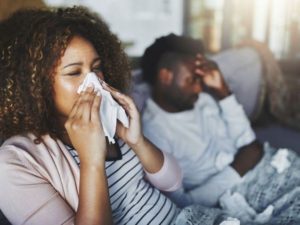As SPRING comes forth so did different strains of flu viruses. This time, they had emerged stronger than ever.

Hong Kong had seen outbreaks. That’s why its health sector is more aggressive in propagating measure for prevention.
Hong Kong aims to keep flu cases at a minimum. If not, to eradicate it completely. While it’s impossible to achieve this because of its drastic weather changes, the country is confident to say that it is still attainable by involving its civilians. In order to protect its community, leaflets are given away through medical clinics. This is to educate the people in a simplest way known to most, information dissemination.
Here are some of the things we, as a community may need to know.
WHAT IS FLU?
FLU or INFLUENZA is a contagious disease caused by the influenza virus. Symptoms may include fever, cough, sore throat, runny nose, muscle pain, fatigue and headache; some may also have vomiting and diarrhoea.
Influenza can be a serious illness to the weak and frail or elderly people.
Here are the clinical features that may be developed during its incubation and onset:
Headache – persistent headaches but not necessarily chronic. This may result from swelling sinuses and building up of mucus.
Fever – The normal temperature of the adult body is from 36.5-37.5 degrees Celsius. For infant to pre-teens, their body is composed of more water than that of the adults because of under developed muscle mass. So it’s for their bodies to heat up that 37.5 degrees Celsius should at least be monitored continuously. On the other hand, the elderly’s muscle mass had somehow diminished and they’re easy to get dehydrated. Which makes their bodies easy to heat up and at the same time go hypothermic as well. Once it’s outside the bounds of the usual range, the key is to closely monitor significant changes. It may have the tendency to spike up and drop down.
Cough – Observe if there’s presence of sputum and what the color does it contain.
Runny Nose – When running nose happens, it’s more likely that headache may result because of sinus blockages.
Vomiting – Because there is the tendency that sputum containing large number of virus and or bacteria may be ingested, vomiting may result. As per observation, my toddler also tends to vomit when the thick colloidal sputum touches the uvula. It results to ‘gag reflex’.
Sore Throat – Continuous hacking up of sputum, coughing and sneezing may result to this.

How does flu spread?
Influenza viruses mainly spread through droplets when infected people cough, sneeze or talk. The infection may also spread by direct contact with the secretions of infected people. Its incubation period is usually around 1-4 days.
How can we prevent flu?
Keep your personal hygiene intact.
- Wash or clean hands frequently and effectively. It’s not enough that you “have” washed your hands. Effective hand washing includes soap and running water. Follow these steps in hand washing most especially after sneezing or coughing.
- Put on a surgical mask when having respiratory symptoms. This is to prevent the germs from spreading as you cough or sneeze.
- Cover nose and mouth when sneezing or coughing. Be responsible for others as well so that it’s not a cycle when getting and healing from Influenza. Take necessary precautions in disposing your soiled tissue. Don’t spit anywhere nor cough or sneeze however in public.

Take action in keeping your environmental hygiene intact.
- Maintain good indoor ventilation.
- When influenza is prevalent, avoid going to crowded or poorly ventilated public places.
Influenza Vaccination
- The influenza vaccination is one of the effective means to prevent seasonal influenza and its complication.
- Usually, it is suggested that vaccination should be received in autumn every year. About 2 weeks after vaccination, the body will develop a sufficient level of antibodies to protect against influenza virus infection.
Who should receive influenza vaccination?
In 2017/2018, the Scientific Committee on Vaccine Preventable Diseases recommends the following priority groups for seasonal influenza vaccination in Hong Kong:
- Elderly persons living in residential care homes.
- Long-stay residents of institutions for the disabled.
- Persons aged 50 years and above.
- Persons with chronic medical problems.
- Health care workers
- Children aged 6 months to eleven years
- Pregnant women
- Poultry workers
- Pig farmers and pig-slaughtering industry personnel.

